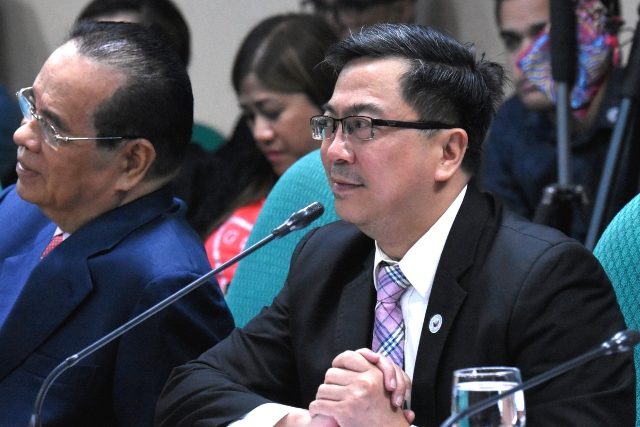SUMMARY
This is AI generated summarization, which may have errors. For context, always refer to the full article.

MANILA, Philippines – After President Rodrigo Duterte unilaterally ordered the termination of the country’s Visiting Forces Agreement (VFA) with the United States, he can also – in theory – direct the withdrawal of the Philippines from the United Nations Convention on the Law of the Sea (UNCLOS) without Senate concurrence, a Department of Foreign Affairs official said on Thursday, February 20.
Foreign Affairs Assistant Secretary Igor Bailen made the statement in response to questions from Senate Minority Leader Franklin Drilon at the Senate foreign relations committee hearing on Senate concurrence in treaties.
Asked by Drilon whether the shared power of the Executive and the Senate in ratifying treaties should also apply to decisions on withdrawing from a treaty, Bailen said: “In treaty-making, the Constitution is express. But the President’s decision to withdraw, it is not. And therefore our position is that it cannot be implied.”
Drilon then asked, “Under your theory, the President can unilaterally withdraw from the treaty on the Law of the Sea?”
“Theoretically, yes,” Bailen said.
Under the 1987 Constitution, Article VII Section 21 states that “no treaty or international agreement shall be valid and effective unless concurred in by at least two-thirds of all the Members of the Senate.”
But the Constitution is silent on the Senate’s role in terminating treaties and international agreements, which Malacañang had used in defending the President’s orders to terminate the VFA, and withdrawal from the International Criminal Court.
During the hearing, Drilon cited important treaties that may suffer the same fate if the Senate would not assert the “mirror principle” in government action on treaties – that the process in withdrawal should follow the same process in accession to the treaty, which requires the concurrence of two-thirds of the Senate.
“The UNCLOS, ASEAN [multilateral agreements] have very wide-ranging [implications] that cannot be left to one man no matter how brilliant…. It is a policy issue, which two political bodies of this government must participate in, especially that Congress is a policymaking body,” Drilon said.
Asked if he agreed with Drilon, Bailen said that he agreed with the point on the “gravity and seriousness of the issue.”
“But with respect to the specific question, the committee right now, we would stick with our position that the President can do so,” Bailen maintained, referring to the President’s action.
UNCLOS is known as the world’s “constitution of the oceans.” Among the countries that are accused of disregarding the sea convention is China, which claims the entire South China Sea on the basis of the supposed historical 9-dash line.
The Philippines invoked UNCLOS and international law in its case against China, which the Philippines won before the Permanent Court of Arbitration in 2016, under the Duterte administration.
In contrast to his predecessor, Benigno Aquino III, Duterte shifted his foreign policy away from the Philippines traditional ally, the US, and towards China. He had refused to enforce the Hague ruling, and even allowed China to fish within the Philippine’ exclusive economic zone and a joint oil and gas exploration deal in specific areas in the West Philippine Sea. (READ: Philippines loses to China 3 years after Hague ruling)
Following the termination of the VFA without Senate concurrence, the Senats leaders headed by Senate President Vicente Sotto III,have decided to file a petition before the Supreme Court to question the need for the chamber’s concurrence in ending treaties.
Drilon said during the hearing that the move “goes beyond the VFA,” particularly on the authority of the Senate in the country’s withdrawal from treaties.
At present, there are more than 20 treaties have provisions expressly asserting the need for Senate concurrence in terminating agreements. – Rappler.com
Add a comment
How does this make you feel?
There are no comments yet. Add your comment to start the conversation.